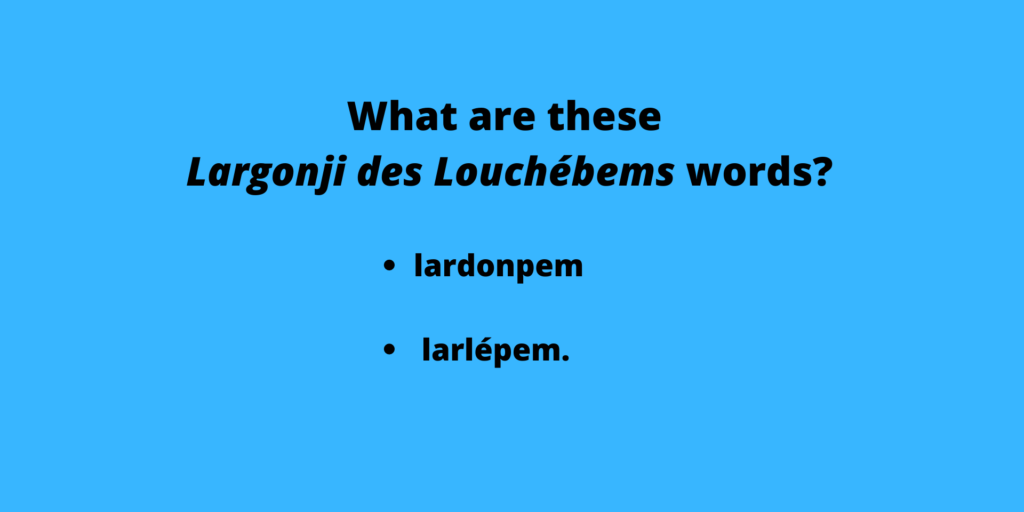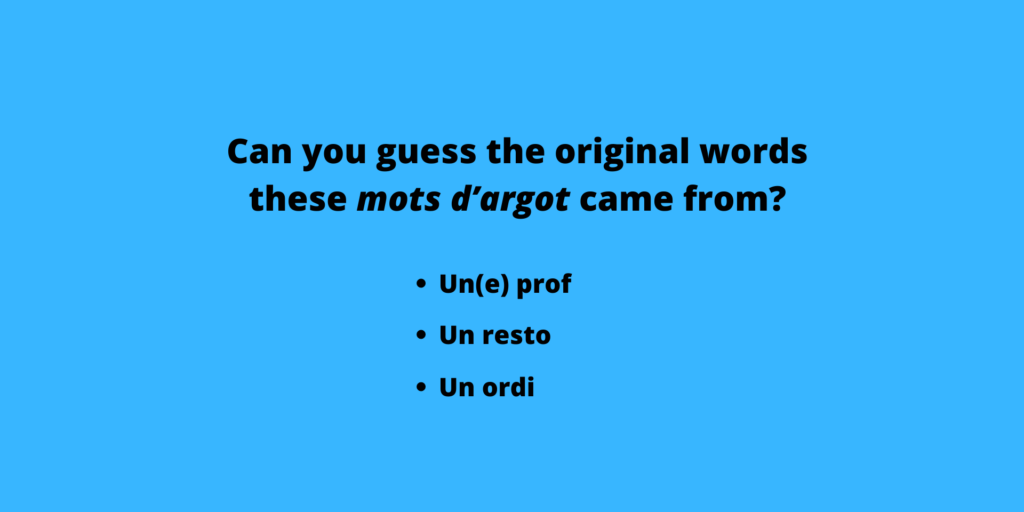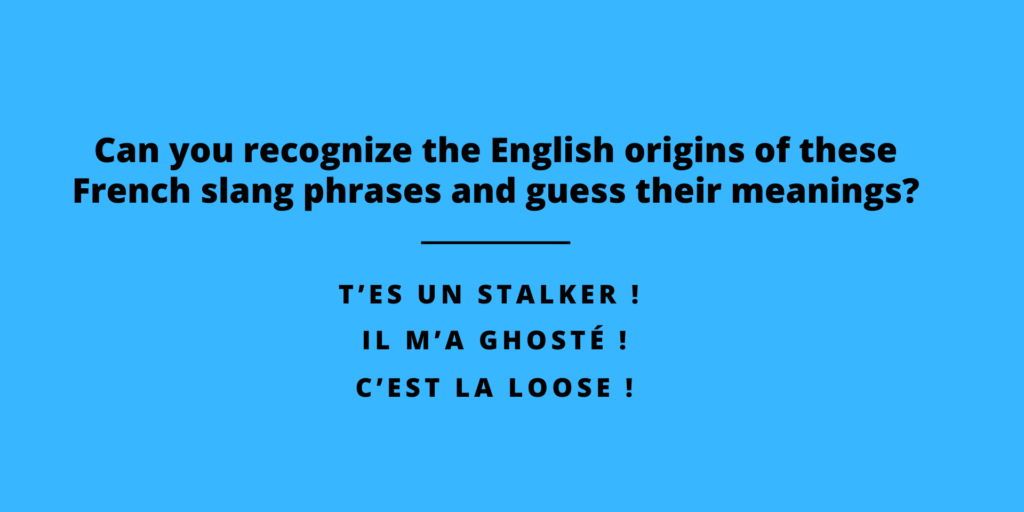
Popular French Slang Expressions and Texting Phrases – L’argot Français!
L’argot, C’est Quoi ? – What is Slang?
J’ai trop le seum ! (I’m pissed!). You may have not understood this expression. Don’t worry, this is argot (slang) and it’s not usually taught at school!
Slang isn’t actually a new form of language. It’s just a unique way to express funny situations, taboos, put-downs, and other linguistic elements that just aren’t quite captured by standard forms of speaking. L’argot is a way of not being understood by authority figures from the police to your parents.
Like every other language, French has its share of slang. And given the country’s rich history and impressive linguistic heritage, French slang words and French slang expressions rank at the very top of worldwide colloquialisms. France, after all, has produced legendary literary figures, raconteurs, and philosophers like Victor Hugo, Voltaire, Jean-Paul Sartre, René Descartes, Antoine de Saint-Exupéry, Michel Foucault, and many more. Thus, the source for French slang words comes from a veritable who’s who of greatest thinkers who ever lived!
And given France’s unique imprint on the rest of the world, French colloquialisms can be found around the globe. For example, even French-Canadian has its own universe of “French-ish” slang that might come in handy if you’re in Quebec or Montreal.
The following French lingo is a great diversion as you’re learning the language. As you learn more French slang expressions, you’ll gain a greater understanding of French culture, history, literature, art, cinema – basically anything and everything to help fill in the gaps while taking French courses and lessons!
Without further ado, let’s examine some of the most well-known French slang phrases, and even a few obscure ones that are sure to impress any native French speaker.
Understanding French Slang
Today, let’s take a quick look at l’argot français!
French Slang: From Jails to Jobs to the Internet
Slang was first born in jails where prisoners could communicate without being understood by prison guards. Deprived of their freedom, it was also a means to create their own world.
History of French Slang – The Largonji des Louchébems
Slang was also widely used by craftsmen in every kind of job during the 19th century. The largonji des louchébems is a striking example. This slang was specific to butchers from Paris and Lyon.
Words in this oral language are concealed by modifying their structure in the following way:
Take the consonant at the beginning of the word and place it at the end. Add the letter “l” to the beginning. Then, add a suffix.
Vous n’avez rien compris ? Voici quelques exemples:
(You didn’t understand? Here are a few examples):
Let’s take a quick look at the word “louchébem” itself:
- The chosen suffix is -em
- The word to modify is « boucher » (butcher)
- The letter “b” is taken out and placed at the end of the word (oucheb) and then an accent on the last “e” is added to keep the sound “é” (ouchéb).
- The first letter is replaced by “l” (louchéb)
- The suffix -em is added (louchébem)
Essayons avec un autre exemple : Lonjourbem
Did you recognize this word? Bonjour !
- The chosen suffix is -em
- The word to modify is « bonjour » (hello)
- The letter b is taken out and placed at the end of the word (onjourb)
- The first letter is replaced by “l” (lonjourb)
- The suffix -em is added (lonjourbem)
In a certain way, the French lingo largonji des louchébems is very similar to what’s known as “Pig Latin” in English – fittingly enough, since butchers invented the particular French slang words associated with this way of speaking.
Why did the butchers use these French slang expressions? One theory is they didn’t want customers to know what went on behind the scenes. In a Parisian butcher shop two hundred years ago…well, you can probably imagine. Quick – call the local health department!Along with expressing an insult, taboo, or generally off-limits topic, largonji des louchébems was yet another form of French slang expressions that served as a “secret language” only understood by those in the know.
Facile !
French Slang Quiz!

*Les réponses sont à la fin! (Answers are provided at the end of the article.)
Le Verlan
Immigration in France in the second half of the 20th century has influenced the way slang is used. This means of expression emerging from a social group has paved the way to today’s Verlan. Verlan became increasingly popular thanks to rap groups in the ’90s.
Verlan in French means “à l’envers” (backwards). You need to reverse syllables to speak Verlan. For instance, louche becomes chelou, and fou becomes ouf. The following video provides an overview of Verlan:
The famous French singer Renaud used Verlan in his song “Laisse Béton” released in 1977. “Laisse béton” means “Laisse tomber” (tom-ber à ber-tom à bé-ton), which means “Drop it!” You can listen to Renaud’s “Laisse Béton” here:
Learn more about Le verlan, here!
French Slang Rules
While l’argot français may be a bit chaotic in its construction, some words obey precise rules.
La Troncation
La troncation means you have to cut one syllable from the word, either at the beginning of the word (une aphérèse) or at the end (une apocope).
Examples of words where there’s a troncation au début du mot (at the beginning of the word):
- Un problème = à un blème
- La musique = à la zic (the spelling is slightly modified (sique/zic) to keep the sound /z/).
Examples of words where there’s a troncation à la fin du mot (at the end of the word):
- Une manifestation = à une manif
- Un cinéma = à un ciné
- Le baccalauréat = à le bac
Note that the cutting of syllables is not always precisely respected (ma-ni-fes-ta-tion; ba-cca-lau-ré-at).
French Slang Quiz!
C’est l’heure de vous entraîner! It’s time for you to practice!

*Les réponses sont à la fin! (Answers are provided at the end of the article.)
The Influence of Immigration and Foreign Languages on French Slang
Les Langues Étrangères – Foreign Languages
French slang has been influenced by a large number of different languages. Immigration explains why many words come from Arabic, Berber, Romani, and Bambara (a language spoken in Mali). This new form of language embodies the fall of old French slang and the emergence of a new, identity-based slang born in the suburbs of big cities.
This relatively new slang has been adopted by French youth, “Le parler d’jeunes,” and reflects the multiculturalism of the French language. Television and movies have also brought lots of English words into today’s French slang.
French Slang Words and Expressions Derived From Other Languages
French Slang Derived from Arabic – Mots d’Origine Arabe
- Kiffer: from kif in Arabic, meaning “to dig or like” in American slang.
- C’est la hess: from hessd in Arabic. This expression means, “It’s a pain/a hell.” If you’re broke and can’t go to a restaurant with your friends, you can use this expression “C’est la hess.” Or if you end up being in the middle of nowhere with nothing to do, you can say it too.
- Le seum: This was the first word you learned in the introduction! It also comes from “samm” in Arabic (literally, “poison”) and means “to be pissed.”
- La hchouma: literally, “shame.” La hchouma is used when something is shameful.
- Meskin (m.)/Meskina (f.): someone who is very unlucky and for whom you have compassion. “Elle est malade, meskina.” (She is sick, meskina.) “Il n’a pas réussi à son examen, meskin” (He failed his exam, meskin.)
French Slang Derived from Romani (Gypsy) – Mots D’origine Tzigane
- Poucave: Another word for “balancer,” which means “to snitch on somebody.” This word is used as a noun and as a verb: “C’est une poucave.” / “Il m’a poucave!” (He’s a snitch/He snitched on me!)
- Chourave: Another word for “voler,” which means “to steal/swipe.”
- Un bédo: Another word for “un joint,” which is the same as the English, “a joint.”
French Slang Derived from Bambara – Mot d’origine bambara
- Une go: This comes from the Bambara word “go” which means “a girl, a woman.”
French Slang Derived from English (Franglish) – Mots d’origine anglaise
- C’est cool! It’s cool!
- Pendant les vacances, je chill. This comes from the English slang “to chill out.”
- Elle bad(e) de ouf. Bad(e) is conjugated from the verb “bader” coming from the English adjective “bad.” It means “to be depressed.” Ouf is the Verlan for fou. “De fou/de ouf” in this context is a slang expression for “very.”
- Tu as checké tes mails? “Checker” comes from the English verb “to check.” “Did you check your emails?”
Note that French slang verbs formed from English are first-group verbs (with -er ending).
French Slang Quiz!

*Les réponses sont à la fin! (Answers are provided at the end of the article.)
French Texting Slang
The growing influence of new technologies in our lives has also had a tremendous impact on today’s French slang. As young people text each other, they resort to shortcuts in the language to express their ideas. Here are a few examples that you may read and hear if you travel to France:
- Askip: “A ce qu’il paraît…” Meaning, “apparently/rumor has it.”
- Je suis au BDR: “Au bout du rouleau” Meaning, “I can’t take it anymore.”
- JPP: “J’en peux plus” Also, “I can’t take it anymore.” Note that French slang usually drops the negation “ne.” From “Je n’en peux plus, you get “J’en peux plus.” Likewise, the expression “no problem/no worries” could be translated into “T’inquiète.” which is “Ne t’inquiète pas.”
- MDR: “mort de rire” Meaning, “LOL.”
- OKLM : “Au calme” Meaning, “Have some peace.” “Je suis OKLM.”
- Je suis en PLS : “Position Latérale de Sécurité,” which is a first aid movement (recovery position). Being in “PLS” means that you are in a bad mood. Synonyms could be “avoir le seum,” “c’est la hess,” and “avoir le bad.”
En conclusion, you have noticed that French slang is very diverse! While it originated with craftsmen and prisoners, immigration and new technologies largely influenced French slang throughout the 20th century. French slang will continue to evolve alongside the cultural and technological phenomena of the present day.
J’espère que vous n’êtes pas trop duper après cette introduction à l’argot français!
I hope you aren’t too confused after this introduction to French slang! Duper is a popular slang word coming from Verlan. It’s originally the word “perdu” (lost/confused), whose syllables have been reversed.
Take Your French a Step Further
Try a free week of our updated Pimsleur French subscription, where you get access to all of our levels, quizzes, videos, and more.
Experiencing French Culture Through Slang and Colloquialisms
So there you have it – a brief history of French lingo, different types of uses for French colloquialisms, and how foreign languages have impacted French slang expressions. Now that you’re well-versed in French slang phrases, you’re ready to explore your own unique avenues of expression.
If you’re traveling to France, try out some French slang on the locals – it’s a great way to break the ice! Any native speaker appreciates when a new language learner goes all in, and you might even learn another phrase or two!
Thanks for visiting Pimsleur – and be sure to keep this information at the ready the next time you visit France or French-speaking Canada!

Solutions for the French Slang Quiz:
For the French slang derived from louchébem:
- lardonpem = pardon
- larlépem = parler
For the French slang derived from troncation:
- un(e) prof = un(e) professeur(e)
- un resto = un restaurant
- un ordi = un ordinateur
For the French slang derived from English:
- T’es un stalker! = You’re a stalker!
From the English, “to stalk someone.” This verb is mainly used on the Internet. Quelqu’un qui stalke is someone who is actively looking for information about someone else on the web.
- Il m’a ghosté = He ghosted me.
From the English slang “ghosting.” This verb is used in French when a person involved in a relationship suddenly stops all contact and communication with their partner without prior warning.C’est la loose = It’s bad luck. “Loose” comes from the English verb “to lose.”